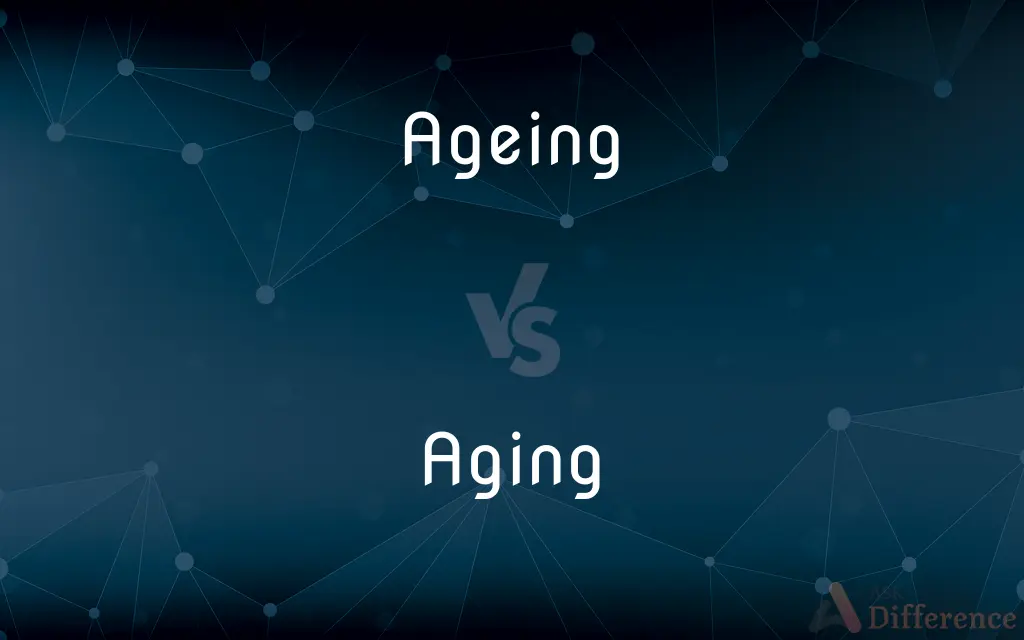Ageing vs. Aging — What's the Difference?
By Tayyaba Rehman — Updated on October 4, 2023
"Ageing" and "Aging" both refer to the process of growing older or maturing, but "Ageing" is primarily used in British English, while "Aging" is American English.

Difference Between Ageing and Aging
Table of Contents
ADVERTISEMENT
Key Differences
The English language has certain spelling variations that are influenced by regional differences. Among these variations are the words Ageing and Aging. Both words relate to the act of becoming older or the passage of time, but the difference in spelling denotes regional preferences.
When we discuss Ageing, we're often using British English conventions. It's a spelling predominantly preferred in the UK, Australia, and other Commonwealth countries. On the flip side, Aging is the spelling that aligns with American English norms and is commonly used in the United States.
In literature, academia, or professional writing, it's crucial to maintain consistency. If one is using British English conventions in their writing, they'd likely stick with Ageing. However, in an American context or publication, Aging would be the preferred spelling.
Beyond spelling, there's no inherent difference in meaning between Ageing and Aging. Both words can describe the physiological, psychological, and social changes experienced as one progresses in age. They can relate to people, animals, or even inanimate objects like wine or infrastructure.
In summary, while Ageing and Aging are semantically identical, the choice between them often comes down to regional language standards and the intended audience's preferences.
ADVERTISEMENT
Comparison Chart
Spelling Variation
Primarily used in British English.
Primarily used in American English.
Regional Preference
UK, Australia, and other Commonwealth countries.
United States.
Meaning
Process of growing older or maturing.
Process of growing older or maturing.
Usage in Literature
Common in British publications.
Common in American publications.
Phonetics
Pronounced similarly to "Aging".
Pronounced similarly to "Ageing".
Compare with Definitions
Ageing
Maturation over a period.
Cheese undergoes ageing to develop its taste.
Aging
The process by which things deteriorate over time.
The aging infrastructure of the city needs attention.
Ageing
The act of growing older.
Ageing is a natural part of life.
Aging
Indicating time's effect on organisms.
Research on aging seeks to understand longevity.
Ageing
The process by which objects deteriorate over time.
The ageing of wine can enhance its flavor.
Aging
Undergoing changes with time's progression.
His aging appearance was evident at the reunion.
Ageing
Describing the progression of time on living organisms.
The ageing population poses economic challenges.
Aging
Maturation over a set duration.
The aging process of whiskey can take years.
Ageing
Ageing or aging (see spelling differences) is the process of becoming older. The term refers especially to humans, many other animals, and fungi, whereas for example bacteria, perennial plants and some simple animals are potentially biologically immortal.
Aging
The process of growing old or maturing.
Ageing
Variant of aging.
Aging
An artificial process for imparting the characteristics and properties of age.
Ageing
Present participle of age
Aging
Present participle of age
Ageing
Having lived for a relatively long (or a specified) time; not young; - used especially of persons. Opposite of young.
Aging
The process of becoming older or more mature.
Ageing
Same as aging.
Aging
The deliberate process of making something (such as an antique) appear (or, in science fiction, become) older than it is.
Ageing
Acquiring desirable qualities by being left undisturbed for some time
Aging
(gerontology) The accumulation of damage to macromolecules, cells, tissues and organs with the passage of time; the progressing loss of health, mobility, vibrancy and body functionality, resulting in biological death.
Ageing
The organic process of growing older and showing the effects of increasing age
Aging
Wear; wear and tear.
Ageing
Growing old
Aging
Becoming elderly.
The aging artist could no longer steadily hold the brush.
Ageing
Undergoing changes with the passage of time.
The building was showing signs of ageing.
Aging
The process by which objects or materials acquire desirable qualities by being left undisturbed for some time under specific conditions. It is used mostly for foods snd beverages, but also for other materials.
Aging
The organic process of growing older and showing the effects of increasing age
Aging
Acquiring desirable qualities by being left undisturbed for some time
Aging
Growing old
Aging
The act of growing older.
Aging is an inevitable process for all living beings.
Common Curiosities
Are Ageing and Aging the same in meaning?
Yes, both refer to the process of growing older or maturing.
Why are there two different spellings?
The difference is regional: "Ageing" is British English, while "Aging" is American English.
Can "Ageing" be used in American publications?
While it's understood, "Aging" is the preferred spelling in American English.
Why is it important to be consistent in usage?
Consistency ensures clarity and adheres to regional language standards.
Can "Aging" be used in British academic papers?
"Ageing" is the conventional spelling in British English, but "Aging" is understood.
Can I switch between the two in a single document?
It's best to stick to one spelling for consistency's sake.
Is one more correct than the other?
Neither is more correct; it's a matter of regional preference.
Do both words apply to inanimate objects too?
Yes, both can describe objects like wine or infrastructure getting older.
Is the pronunciation different?
No, both words are pronounced similarly.
Is the difference just American vs. British English?
Primarily, though other English-speaking regions may have their preferences.
Share Your Discovery

Previous Comparison
Suppress vs. Repress
Next Comparison
Hot vs. SunnyAuthor Spotlight
Written by
Tayyaba RehmanTayyaba Rehman is a distinguished writer, currently serving as a primary contributor to askdifference.com. As a researcher in semantics and etymology, Tayyaba's passion for the complexity of languages and their distinctions has found a perfect home on the platform. Tayyaba delves into the intricacies of language, distinguishing between commonly confused words and phrases, thereby providing clarity for readers worldwide.
















































